Ellis Island and the Immigrant Journey: Inside the Barge Office and the Board of Inquiry (1899)
📌 Explore the immigrant experience at the Barge Office, New York, in 1899, where men, women, and children passed through the scrutiny of the Board of Inquiry. Learn about the challenges they faced and the diverse nationalities that shaped America's immigration history.
Ellis Island: The Great Gateway to America - 1899
Overview and Relevance to Immigration History 🌎🏛️
"Ellis Island: The Great Gateway to America - 1899" is a detailed, evocative article that sheds light on the immigrant experience at one of America’s most iconic landmarks. It captures the systematic process of immigration, particularly during the post-fire reconstruction period when immigrants were temporarily processed at the Barge Office in New York Harbor. This article serves as an essential piece for teachers, students, genealogists, and historians interested in understanding the complexity of early American immigration. It provides a snapshot of the rigorous processes, social challenges, and human stories that characterized the journey for many immigrants entering the United States.
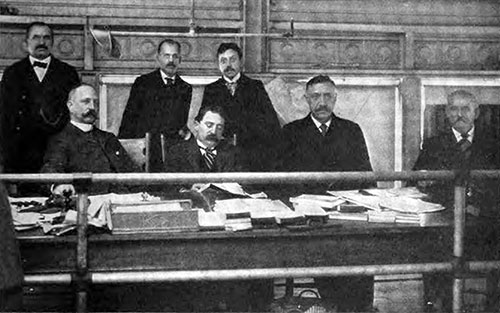
The Board of Inquiry. The Men Who Pass Upon the Eligibility of Immigrants to Become Americans. Metropolitan Magazine, February 1899. | GGA Image ID # 14c0091008
From 16 June 1897, until Ellis Island reopened in December 1900, immigrants landed at the Barge Office in New York. During the rebuilding of Ellis Island after the fire of 1897, immigrants were processed at the Barge Office. A ship, the "Narragansett," was employed to house temporarily detained immigrants. This article documents the time immigrants were processed at the Barge Office.
The foreigner who seeks to become a resident or citizen of this great modern Republic does not find the latch-string on the outside unless he is mentally sound, morally in good health, physically healthy, and, to a certain extent, in good financial condition.
In other words, he must have a certain amount of money with which to make his way in a new community; he must be physically able to perform such labor as any stranger may be required to do to earn a living so that the immigrant may not become a public charge on the community he enters. The weight of financial stability cannot be overstated in this context.
The law's conditions should be easy enough for the average immigrant to comply with. Still, it is apparent enough, when one looks into the detention section at the Barge Office in New York, that too many ignorant men and women conclude that all that is necessary to grasp a fortune in America is to buy a steamship ticket, wrap a few articles of clothing in a big handkerchief, and embark for these shores. The detention process at the Barge Office, while necessary for screening, was not without its challenges and controversies.
Hundreds of shiftless men and more shiftless women find the doors of the great, free country barred against them, grumble at the care the nation takes in selecting its citizens, and go back to resume a shiftless career in some of the older countries of Europe.
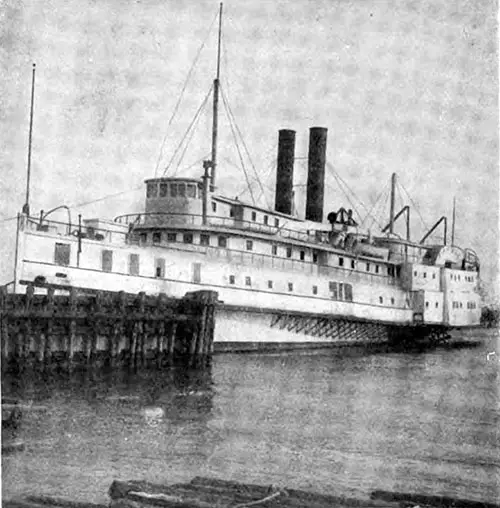
The Narragansett, On-Board of Which Immigrants Are Quartered. Metropolitan Magazine, February 1899. GGA Image ID # 14c1015229
The Narragansett was a repurposed vessel used circa 1898 as temporary housing for immigrants at the Barge Office in New York Harbor, serving as an overflow facility during periods of high immigration traffic. Previously a steamship, the Narragansett was anchored near the Battery and provided basic accommodations for detained immigrants awaiting processing or further inspection before entering the United States. Following a fire that damaged Ellis Island in 1897, the vessel was utilized, necessitating alternative housing solutions until the main immigration station was rebuilt. Despite its cramped and rudimentary conditions, the Narragansett played a crucial role in ensuring that immigrants had shelter during their entry into America.
Note: More interior views of the Narragansett appear later in this article.
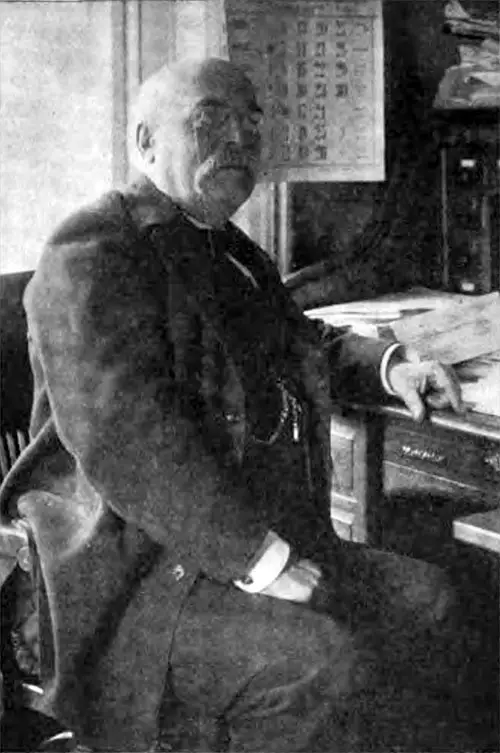
Hon. Thomas J. Fitchie, United States Commissioner of Immigration, Port Of New York. Metropolitan Magazine, February 1899. | GGA Image ID # 14c00a6d74
The Board of Inquiry at the Barge Office notes some pathetic tales in the records of its investigations. Still, the men who judge the fitness of immigrants can take no account of the pathetic side. They are acting as impartial guardians of American society's welfare, and they must act without regard to the feelings of others.
A pitiful case that shows the dense ignorance of the average immigrant was heard by the Board a few weeks ago. A French farmer had left a home and a family behind him and arrived in New York with a ticket to Montreal and forty cents in silver coins as his only earthly possessions.
Ordinarily, if he had had more money, his story could have never been told since immigration officials are not seeking to guard Canada's welfare. There was a question, however, whether this poor fellow would ever reach his destination or be left a pauper in some American community.
Jean had listened to the sweet talk of a ticket agent. He had been told of the significant advantages of life in Canada and assured that he could make a living by chopping wood in winter and doing farm work in summer.
He had disposed of some of his belongings and reached New York with nothing. He is probably going from Havre to his little farm, afoot and weary. The steamship company was compelled to return him to the port from whence he sailed but assumed no further responsibility.
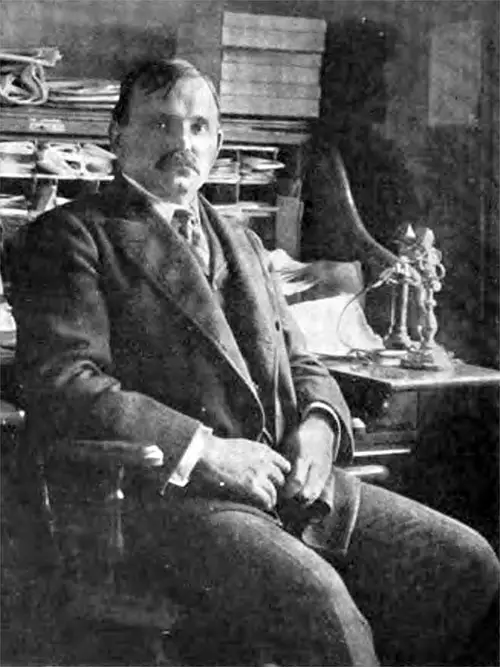
Hon. Edward F. McSweeney, Deputy Commissioner. Metropolitan Magazine, February 1899. | GGA Image ID # 14c019b239
But tales of poverty are not the only means of breaking down the barriers that shut these foreigners out of America. A wealth of cunning is wasted in the effort to overcome the law's objections to undesirable immigrants.
Supposed husbands call for detained women, who tell stories of long residence here but who have probably reached Ellis Island on the same steamers as their alleged wives. Fortunately, the close inspection of this class of immigrants has resulted in the breaking up of the most terrible traffic in human enslaved people.
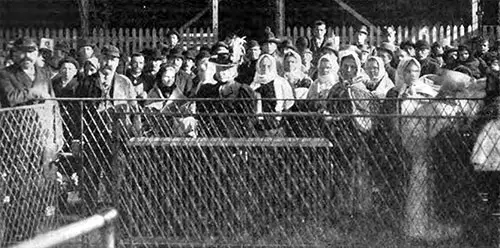
Hungarian Peasants Passing Through the Barge Office. Metropolitan Magazine, February 1899. | GGA Image ID # 14c0244f77
There is a multifaceted interest in the inspection and examination of immigrants at the Barge Office. Relatives of incoming immigrants continually besiege the offices of Commissioner Fitchie and Deputy Commissioner McSweeney. The Board of Inquiry, with its staff of interpreters and stenographers, accomplishes its work only by holding daily sessions that continue all day.
In and out of the little room occupied by the Board files a line of foreigners of all nations, ages, and sexes. The turbaned Turk elbows the Russian Jew, and the Greek, in the dress of his native land, follows a Slavonian giant as they answer the necessary questions under the law.
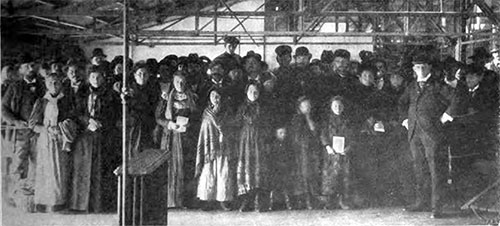
A Motley Group of All Nations Who Have Failed to Pass the Inquisitor Ordeal. Metropolitan Magazine, February 1899. | GGA Image ID # 14c09a8781
An unusual incident during a short-timed Board session was the examination of a Russian Jew, accompanied by his wife and seven children. The interpreter addressed each in Yiddish but was taken aback when a sixteen-year-old girl, apparently the head of the little family party, answered all in English without hesitation.
That girl had previously spent five years in this country in the homes of her father's sisters, who, because of advantageous marriages and thrifty habits of life, had reached a state of opulence that appeared to stagger the recently arrived brother.
Two of these women, handsomely dressed and bearing all the exterior indications of great prosperity, were admitted to the room after examining the Russian and his children.
The beadlike eyes of the family head danced in their sockets as he gazed at the silks and satins of his favored relatives, and he appeared to wonder how these two women might have been the girls who left him behind in Russia fifteen years ago.
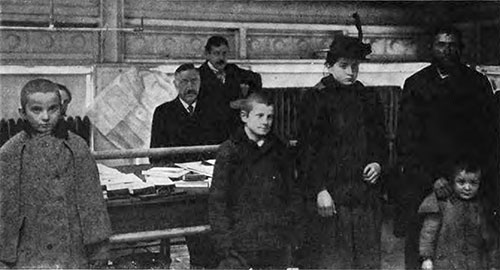
Before the Board of Inquiry. A Russian Jew And Part of His Family of Eight. Metropolitan Magazine, February 1899. | GGA Image ID # 14c0a33d0b
The women unselfishly promised that their brother and his family would be carefully looked after in their new home, and the family party left the Barge Office to wonder at the greatness of a great metropolis in a new country.
All showed their evident pride, but the proudest was the girl of sixteen, the chief marshal of the invading army. Six months before, she had gone from New York to Middle Russia. In those six months, she had made all the arrangements for transporting brothers, sisters, father, and mother to a land where prospects are brighter and possibilities greater than elsewhere in this vast, wide world.
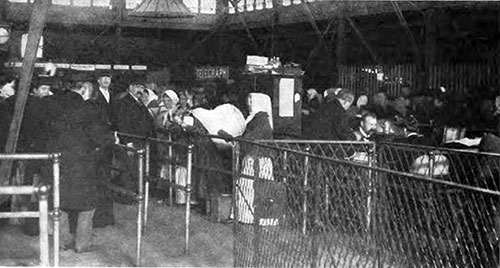
A Line of Immigrants at the Last Gate of The Barge Office Where Immigration Officers Make Their Final Approval of Their Entrance Papers to the United States. Metropolitan Magazine, February 1899. | GGA Image ID # 14c0a7a654
Not so happy was the great giant Slav, who took his turn before the inquisitors. He stood six feet, six inches high, and wore no coat. From his pockets hung a great tobacco pouch made from goatskin, a reminder of his home and the ingenuity of some village artisan.
In his waistcoat pocket was a long-stemmed German pipe, a badge of the genuineness of his story about his country.
He was, he said, a stonemason. Still, there was too evident an indication that he was bound for the Pennsylvania coal regions, where so many of his compatriots are making life wearisome for American workingmen, who find it hard to get living wages from their arduous work.
Eighty dollars had been the sole possession of this giant when he left his wife behind. It was spent on food and railway and steamship fares. He arrived in New York with his tobacco pouch well filled but nothing else of earthly value—not even a coat to shut out the cold. He took his turn among the detained division at Ellis Island. He returned to Hungary on the steamer that brought him here.
These are a few incidents randomly picked up in a day's visit to the Immigration Bureau. A dozen others, as hopeless in tone, might be cited because the stories are told daily, and the ferryboat that brings the men and women from Ellis Island to the Battery is a busy craft, and the grind of business is ceaseless.
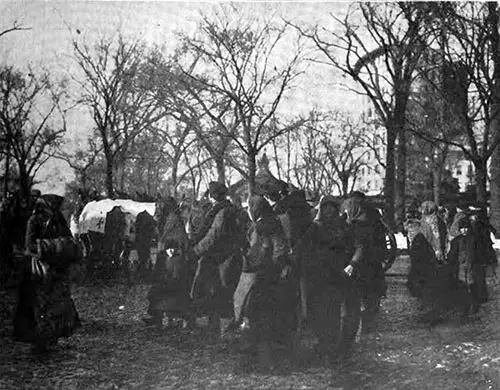
A Group of Russian Mennonites Who Have Just Passed the First Portals to American Citizenship. Metropolitan Magazine, February 1899. | GGA Image ID # 14c0ade541
Some stories have a brighter side, and those have a darker side. An Irishman with ten children, all ruddy-faced boys that will grow into strong and healthy men, was the happiest and most light-hearted man I saw; the little French farmer the most hopeless and helpless.
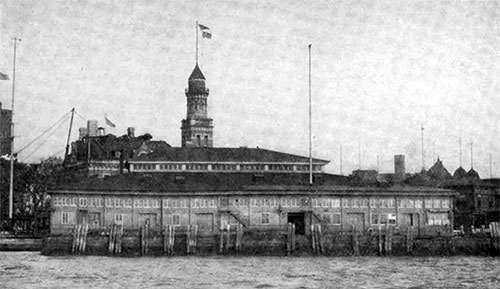
The Barge Office. The Immigrant's First View of The Metropolis Of New York. Metropolitan Magazine, February 1899. | GGA Image ID # 14c0e4f3dc
The Irish are generally the happiest immigrants, and their proportion of deportations is smaller. The English do not come in droves, but most get over the barrier comfortably. I saw one fellow who was to be deported.
His Cockney brain could not comprehend the reason for his being sent away. He was dumbfounded when an attendant spoke to him in Yiddish, mistaking his nationality. He talked of fraud in all its aspects, saying that he had produced forty dollars when called upon and had passed a proper physical examination. His appearance gave the lie to the latter assertion.

View of Ellis Island from the Bay. Metropolitan Magazine, February 1899. | GGA Image ID # 14c0f8a71e
While there are no buildings on Ellis Island, the cramped quarters at the Barge Office present some busy pictures. There is rush and bustle everywhere, and the divisions that separate the classes of immigrants according to the officials' rulings are crowded on steamer days.
There is always a crowd of anxious relatives waiting at the front of the building, and the talented ticket agent who separates the immigrant from his money in exchange for passage to the Western States is always in evidence. The lodging-house runner never sleeps, nor does he tire of telling tales about the luxurious entertainment his hostelry affords.
The confusion of tongues outside the administration offices is fully equaled by the humming Babel in the divisions inside the building, where thousands of human beings are assembled from lately arrived ships.
But if the variety of language is confusing, the colors of these strange folks' costumes are as bewildering in their ever-changing variety. A dozen Hungarian peasant women stand in line, awaiting the final official release by the clerks at the gates.
Their heads are covered with handkerchiefs and in great packs. Heavy loads, even for an animal of burden, and hanging from their shoulders are each animal's earthly belongings. But they are a happy lot. They smile when spoken to and enjoy the experience of having crossed a sea for a home.
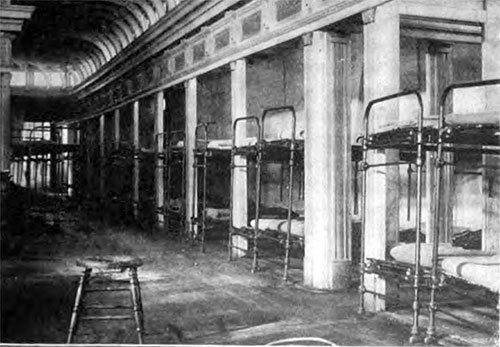
Women's Sleeping Quarters on The Narragansett. Metropolitan Magazine, February 1899. | GGA Image ID # 14c10d4eb6
The big Germans are Stolid and self-possessed and generally head family parties of five to a dozen. In the German section, individual immigrants attract attention because of peculiarities of dress and manner. Separated from the big national groups, I saw one overgrown German boy who was a picture of himself.
He wore heavy hob-nailed boots and clothes that had been all too outgrown in the race between boy and tailor. The lad carried a great valise that would have taxed the strength of a steamship porter, and he stopped outside the building and mopped from under his peaked cap the sweat that rolled down his forehead.
This lad had supplied him with two sources of comfort for his sojourn in a strange land. From the upper pocket of his coat protruded the long stem of a pipe that his grandfather might have smoked thirty years ago, and above the lower pocket, there peeped the edges of a Bible bound in red and gold. With these and his health and strength, this boy entered American life from Battery Park as courageously as a general at the head of an invading army.
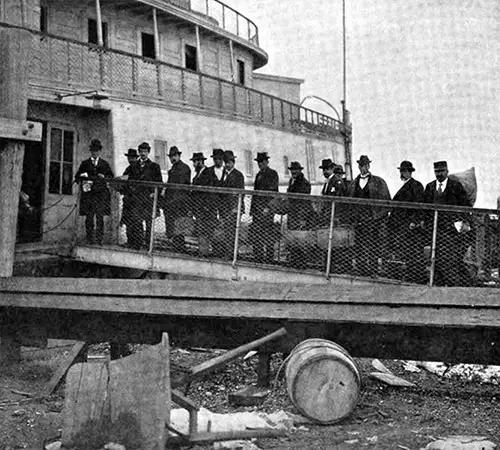
Immigrants Going Aboard the Narragansett. Metropolitan Magazine, February 1899. | GGA Image ID # 14c18ba55b
It is different from the women who come to America unprotected and unaccompanied. The English-speaking girls are well cared for by an agent of the Mission of Our Lady of the Holy Rosary. The young Irishwomen who arrive here intending to take domestic situations find temporary shelter in the home attached to the Mission, and the attachés attend to all of the work of buying railway tickets and forwarding baggage.
The terror of the moneychanger is no longer what it was for the immigrant. The money-changing business is conducted in the building, and railway tickets are also sold there so that to the wide-awake stranger, there is little trouble or discomfort attached to getting into America and finding the way to his new home, no matter if it is on some small farm in the distant Northwest.
Some of these strangers resorted to many first tricks and devices to guard against inconveniences, however. To keep a family of ten together on their transcontinental tour, they were attached to each other with a long rope. They arrived on the South Dakota farm safe and sound, all simultaneously.
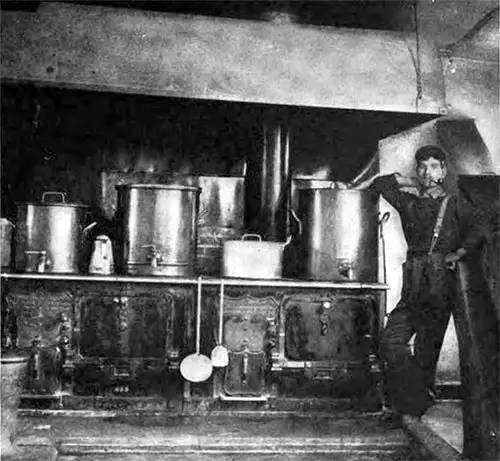
The Kitchen on The Narragansett. Metropolitan Magazine, February 1899. | GGA Image ID # 14c1abc96d
The quarters of the immigrant's time waiting for his final permission to land are impressive. Since the burning of the department's buildings at Ellis Island, the big Sound steamboat Narragansett has been moored at the island, and on this great vessel, sleeping and eating quarters have been arranged—on one deck for the men and on the other for the women. The illustrations show how the immigrants live during their period of detention.
The new buildings on Ellis Island will be completed within a few months. The facilities for introducing foreigners to America and American civilization will be more than ample for the passage through New York of a half-million immigrants every year.
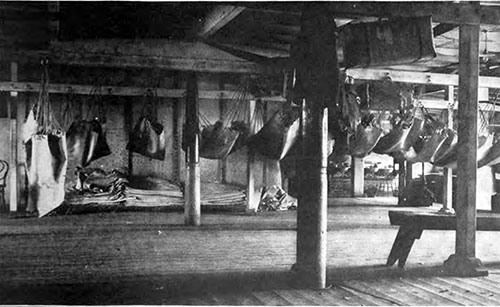
The Men's Sleeping Quarters on The Narragansett. Metropolitan Magazine, February 1899. | GGA Image ID # 14c1b44a32
There is a reason for this endless coming and going between Ellis Island and the Barge Office. The Immigration Department figures show that during the year ending in June last year, 218,562 immigrants arrived at American ports, of whom 178,748 landed at the port of New York to undergo the rigid system of investigation that holds sway with the Board of Inquiry.
In other words, an average of more than 500 immigrants arrived at the port of New York every day, not counting the fact that steamer days of the long lines are not coincident with the days of the week. These figures give the impression that the work of the investigating officials is by no means an easy one.
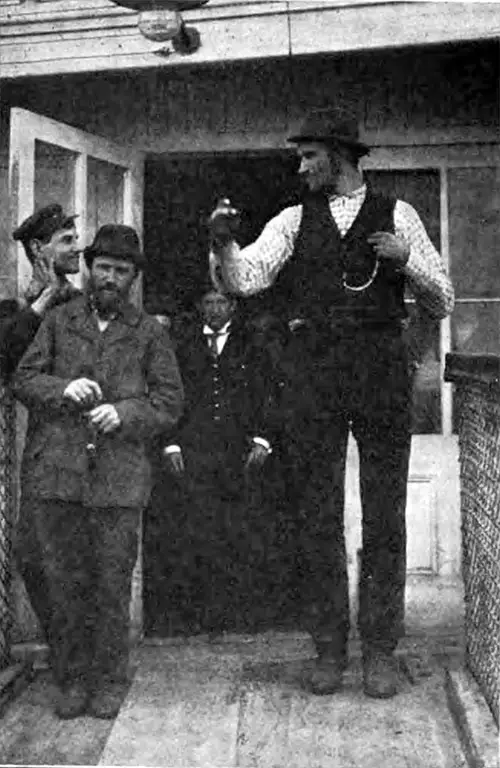
A Slavonian Giant and a Russian of Ordinary Size. Metropolitan Magazine, February 1899. | GGA Image ID # 14c22e7bdc
The nationality of the men and women who seek their homes and fortunes in America is much mixed. Italy leads in the number of immigrants, and it also results in all probability in the number of persons who, having amassed small fortunes, return to their European homes with never an idea of becoming citizens of the country that has helped them to positions of affluence.
Of all European countries, Turkey received the smallest number of immigrants during the year, with only 176 of the sultan's subjects passing through the country's ports.
After Italy, Russia furnished the most significant number of immigrants. However, that country's total was exceeded by the combined contribution of the United Kingdom of Great Britain. Ireland sent 25,128 immigrants during the year, and it is a fair supposition that 20,000 of that number will remain in America and become citizens of the Republic.
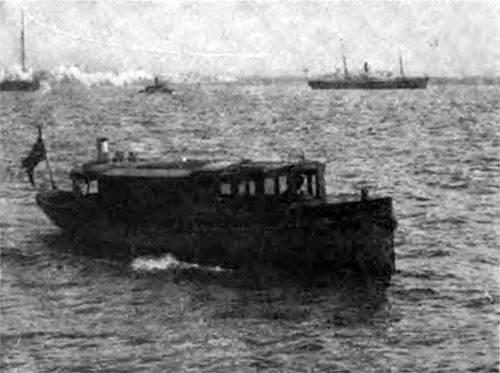
The Launch "Samoset," Used by Officials. Metropolitan Magazine, February 1899. | GGA Image ID # 14c303cd79
One requirement of immigration law is that each immigrant of adult age be able to show at least thirty dollars in money or give other evidence that he is not likely to become a public charge. Twenty-seven thousand adults coming to America last year possessed more than thirty dollars each. Still, 96,000 of them had less than thirty dollars in their possession.
Of course, some of these latter were deported, the eloquence of some steamship agent saddling the company with the necessity of giving the ticket buyers an excursion trip for the price of one steerage fare.
One interesting feature of the Bureau's report is the number of people who have come to America to join relatives who have preceded them in the search for new homes and new fortunes.
The figures show that 99,717 of the total number of immigrants last year belonged to this class. This indicates that the number of immigrants finding their new homes congenial is enormous, and it also shows that the prosperity they seek is frequently observed; otherwise, families would not have the necessary funds to pay for ocean passage to join the pioneer members.
Charles B. Smith, "The Great Gateway to America," in the Metropolitan Magazine, Vol. IX, No. 2, February 1899, pp. 129-138.
Key Points and Engaging Content 📝
The Role of the Barge Office and the Rebuilding of Ellis Island 🏗️🌉
Following the 1897 fire that damaged Ellis Island, immigrants were processed at the Barge Office until the station was rebuilt. The Narragansett, a former steamship, was repurposed to house temporarily detained immigrants.
This period highlights the challenges of managing high immigration traffic and the temporary solutions that ensured immigrants still had shelter and basic needs met before being processed.
🖼 Noteworthy Image: "The Narragansett, On-Board of Which Immigrants Are Quartered" – The image vividly depicts how the immigrants were housed in cramped conditions while waiting for their formal processing.
The Board of Inquiry and the Immigration Process 📝🔍
The Board of Inquiry, a key component in the immigration process, determined whether immigrants could enter the country. The board was responsible for scrutinizing immigrants' financial stability, health, and ability to avoid becoming public charges.
This system is portrayed as both necessary and impartial, serving as a gatekeeper for new arrivals but also revealing some of the hardships and misunderstandings immigrants faced in trying to meet the country's stringent requirements.
🖼 Noteworthy Image: "The Board of Inquiry. The Men Who Pass Upon the Eligibility of Immigrants to Become Americans" – This image highlights the officials tasked with examining and processing the many immigrants arriving at Ellis Island.
Challenges Faced by Immigrants 💼💸
One particularly poignant case involves a French farmer, Jean, who arrives in New York with only 40 cents and no understanding of where he is headed. His story is a testament to the difficulties many immigrants faced when relying on misinformation or unwise decisions about their future in America.
The article also highlights the deportation process for immigrants who failed to meet certain criteria, with shiftless individuals often being sent back to Europe, underscoring the barrier created by immigration laws for many hopeful immigrants.
🖼 Noteworthy Image: "A Group of Russian Mennonites Who Have Just Passed the First Portals to American Citizenship" – This image symbolizes the hopeful moment for immigrants who successfully pass the inquiry process.
Immigrant Diversity and the "Inquisitor Ordeal" 🌍👥
The article describes the multinational makeup of immigrants passing through Ellis Island, including Hungarians, Russian Jews, Turks, and Greeks, each with their own unique experiences and struggles.
A Russian Jewish family, for instance, has to prove their financial stability and familial connections before being allowed entry, illustrating the personal and legal intricacies of the immigration process.
🖼 Noteworthy Image: "A Motley Group of All Nations Who Have Failed to Pass the Inquisitor Ordeal" – This image portrays the human element of immigration, showing individuals who have failed to pass the inquiry process, adding a layer of empathy to the otherwise bureaucratic examination.
Stories of Hope and Rejection ✨🚪
While many immigrants faced hardship and rejection, others were lucky enough to be welcomed by family or friends already settled in America. The successful passage of an Irishman with ten children stands in stark contrast to the failed journey of a Slavonian giant who could not meet the required financial conditions.
🖼 Noteworthy Image: "A Line of Immigrants at the Last Gate of The Barge Office" – This image shows the final stage of the immigration process, symbolizing both the success and rejection that immigrants faced as they awaited approval.
Immigration Statistics and Nationalities 📊🌐
The article includes immigration statistics from the year, highlighting Italy as the leading country of origin, followed by Russia and the UK. It sheds light on how immigrants from different nations were processed differently and how their backgrounds shaped their experiences at Ellis Island.
📌 Noteworthy Insight: The article mentions how many immigrants were trying to join relatives already settled in America, indicating that family reunification played a major role in immigration decisions during this period.
Educational and Historical Value 🎓📜
📌 For Teachers and Students: This article provides an excellent resource for teaching the history of American immigration, particularly the late 19th century. It offers a glimpse into the bureaucratic systems used to control immigration and highlights the human stories behind the numbers. The text is rich with material that can be used for class discussions on the challenges of assimilation, racial and ethnic diversity, and immigration law.
📌 For Genealogists: For those researching ancestors who immigrated to the U.S. during this period, the article provides useful context for understanding the immigration process. The mention of immigrant families and the records kept at Ellis Island will be valuable for genealogical research, especially for individuals with roots in Italy, Russia, or Ireland.
📌 For Historians: The article offers a snapshot of the social and legal climate surrounding immigration at the time. It highlights the immigration quotas, deportation rates, and the ethnic composition of those arriving at Ellis Island, making it an important document for historians studying the social fabric of late 19th-century America.
Suggested Improvements and Considerations ✨
While the article provides a great deal of historical insight, it could benefit from more personal anecdotes or firsthand accounts of immigrants, which would provide a deeper, more personal perspective. Interviews or letters from immigrants themselves could humanize the experience and offer readers a clearer emotional connection to the material.
This article is a powerful reminder of the complexities and humanity of the immigration process at the turn of the 20th century, emphasizing both the hardships and hopes of immigrants seeking a better life in the United States. It offers readers a deep dive into one of the most significant immigration stations in American history, highlighting the system that shaped the nation’s demographics.
🔎 Research & Essay Writing Using GG Archives
📢 This is NOT a blog! Instead, students and researchers are encouraged to use the GG Archives materials for academic and historical research.
🔎 Looking for primary sources on Titanic’s lifeboat disaster? GG Archives provides one of the most comprehensive visual collections available today.
